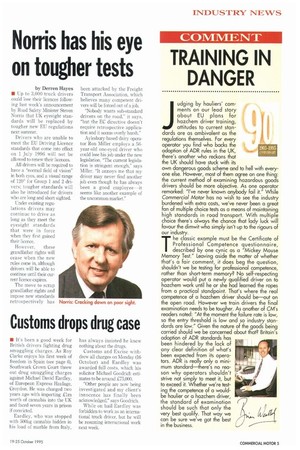COAIMEN"F
Page 7

If you've noticed an error in this article please click here to report it so we can fix it.
TRAINING IN DANGER
Judging by hauliers' comments on our lead story about EU plans for hazchem driver training, attitudes to current standards are as ambivalent as the regulations themselves. For every operator you find who backs the adoption of ADR rules in the UK, there's another who reckons that the UK should have stuck with its own dangerous goods scheme and to hell with everyone else. However, most of them agree on one thing: the current method of examining hazardous goods drivers should be more objective. As one operator remarked: "I've never known anybody fail it." While Commercial Motor has no wish to see the industry burdened with extra costs, we've never been a great fan of multiple choice tests as a means of maintaining high standards in road transport. With multiple choice there's always the chance that lady luck will favour the dimwit who simply isn't up to the rigours of our industry. The classic example must be the Certificate of Professional Competence questionnaire, described by one cynic as a "Mickey Mouse Memory Test." Leaving aside the matter of whether that's a fair comment, it does beg the question, shouldn't we be testing for professional competence, rather than short-term memory? No self-respecting operator would put a newly qualified driver on to hazchem work until he or she had learned the ropes from a practical standpoint. That's where the real competence of a hazchem driver should be—out on the open road. However we train drivers the final examination needs to be tougher. As another of CM's readers noted: "At the moment the failure rate is low, so the entry threshold is low and so industry standards are low." Given the nature of the goods being carried should we be concerned about that? Britain's adoption of ADR standards has been hindered by the lack of any clear definition of what's been expected from its operators. ADR is really only a minimum standard—there's no reason why operators shouldn't strive not simply to meet it, but to exceed it. Whether we're testing the competence of a wouldbe haulier or a hazchem driver, the standard of examination should be such that only the very best qualify. That way we can be sure we've got the best in the business. 1905-1995 MMUS'




















































































































